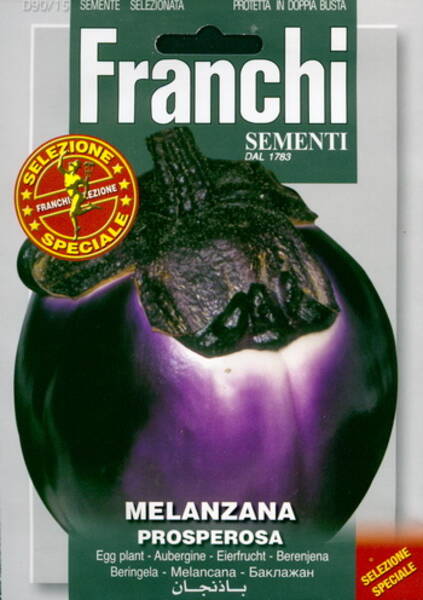Looking for a high-yielding, delicious eggplant variety that's easy to grow? Look no further than the "Prosperosa" eggplant! This exceptional hybrid offers a bountiful harvest of flavorful, versatile eggplants perfect for all your culinary creations.
The "Prosperosa" eggplant is a mid-season variety, typically maturing in 100-105 days, ideal for growing under film shelters or in greenhouses. The plant itself is moderately sized, reaching a height of 60-70 cm. What truly sets this variety apart are its fruits: large, shortened-pear shaped, and boasting a smooth, dark-violet skin at peak ripeness. Each eggplant weighs in at a substantial 200-250 grams. The flesh inside is tender, light-green, and delightfully free of any bitterness.
Key Characteristics of "Prosperosa" Eggplant:
- High Yielding: Expect an abundant harvest from each plant.
- Excellent Fruit Set: Even in cooler temperatures, this hybrid sets fruit reliably.
- Extended Fruiting Period: Enjoy a long and plentiful harvest season.
- Superb Flavor: The mild, non-bitter flesh is perfect for a variety of dishes.
- Disease Resistance: "Prosperosa" exhibits good resistance to common eggplant diseases.
Growing and Usage Features:
Growing seedlings for both open and protected ground is essentially the same. Preparation, sowing times, and seedling care are similar to peppers and tomatoes, but eggplants are typically sown about ten days earlier. Sow seeds in a box with a nutrient mixture to a depth of about 2 centimeters. The soil then needs to be watered abundantly, and after the excess moisture drains, the box is placed in a warm place, but not near a radiator. The box is covered with film (so that the lower layer of soil does not dry out), and after the first shoots appear, it is transferred to a lighter and cooler place. As the seedlings emerge, the film is constantly removed from the box. After the appearance of the first leaf, the seedlings must be dived into separate cups or pots. The main rule for caring for eggplant seedlings is watering: the soil should be constantly moderately moist. A good harvest will be given by seedlings 10-12 centimeters high, with 5-7 true leaves, a thick stem and a developed root system.
Eggplants do not tolerate transplanting well, so it is better to grow them in separate pots.
Hardening plants is important: they take root faster and can be planted earlier in open ground. When preparing the site, organic fertilizers (compost, humus) and mineral fertilizers (ammonium nitrate 30-40 g per m2 or urea 20-25 g), phosphorus and potassium fertilizers at the rate of 20-30 g per 1 m2 are applied. Eggplants are planted 50-70 cm between rows and 25-30 cm between plants. Before planting, eggplants need abundant watering. Seedlings are chosen with a clod of earth so as not to damage the root system. Plant vertically, 2-3 cm deeper than it grew. After planting, water abundantly and shade in sunny weather for 5-10 days.
Growing eggplants in greenhouses or greenhouses has its own characteristics. Seeds are sown earlier than for open ground: in early to mid-March, seedlings are prepared only in pots, without picking. The planting scheme will also be different - 40-60 cm between rows and 35-40 cm between plants.
Care mainly consists of watering, loosening, fertilizing and weeding. Depending on the condition of the plants, top dressing is carried out after 20-25 days: 10-20 g of ammonium nitrate or 10-15 g of urea and 10-15 g of phosphorus and potassium fertilizers. A solution of mullein (1:10) or bird droppings (1:15) is also used - 10 liters per 8-10 plants. You need to be very careful with top dressings, as a high concentration of nutrients can cause great harm to plants. After top dressing, watering or rain, the soil is loosened and slightly hilled.
Eggplants reach ripeness 25-40 days after the formation of the ovary. Fruits need to be harvested regularly, as delays reduce the yield. Eggplants are 90% water, 3% sugar and fiber, and contain many vitamins and minerals. Eggplants contain carotenoids, vitamins C, B1, B2, trace elements - copper (0.01 mg%), iron, manganese (0.05 mg%). They contain the most potassium.
The main medicinal merit of eggplants is the prevention and treatment of atherosclerosis. Eating eggplant dishes helps improve heart function and prevents the deposition of lactic acid salts. In addition, they will be useful for patients with gout, uric acid diathesis, and liver diseases.
Culinary Versatility: "Prosperosa" eggplants are incredibly versatile in the kitchen. Their mild flavor and tender flesh make them ideal for:
- Grilling
- Roasting
- Stir-frying
- Baking
- Pickling
- Canning
Order your "Prosperosa" eggplant seeds today and experience the joy of growing your own delicious, healthy, and abundant harvest!
1.0 g contains approximately 260 seeds.















